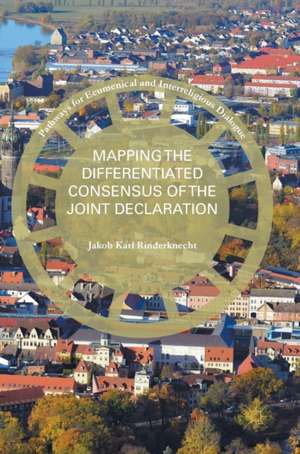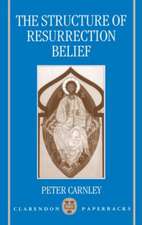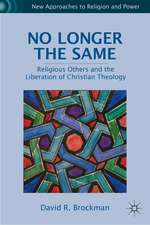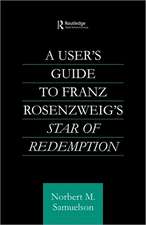Mapping the Differentiated Consensus of the Joint Declaration: Pathways for Ecumenical and Interreligious Dialogue
Autor Jakob Karl Rinderknechten Limba Engleză Hardback – 17 oct 2016
This book uses the insights of cognitive linguistics to argue for the possibility of differentiated consensus between separated churches. The Joint Declaration on the Doctrine of Justification, signed by the Lutheran World Federation and the Roman Catholic Church in 1999, represents the high water mark of the twentieth-century ecumenical movement. It declares that the sixteenth-century condemnations related to justification do not condemn the teachings of the partner church. Some critics reject the agreement, arguing that a consensus that is differentiated is not actually a consensus.
In this book, Jakob Karl Rinderknecht shows that mapping the "cognitive blends" that structure meaning can reveal underlying agreement within apparent theological contradictions. He traces Lutheran and Catholic positions on sin in the baptized, especially the Lutheran simul iustus et peccator and the Catholic insistence that concupiscence in the baptized is not sin. He demonstrates that the JDDJ reconciles these positions, and therefore that a truly differentiated consensus is possible.
| Toate formatele și edițiile | Preț | Express |
|---|---|---|
| Paperback (1) | 468.57 lei 6-8 săpt. | |
| Springer International Publishing – 20 iun 2018 | 468.57 lei 6-8 săpt. | |
| Hardback (1) | 642.18 lei 6-8 săpt. | |
| Springer International Publishing – 17 oct 2016 | 642.18 lei 6-8 săpt. |
Din seria Pathways for Ecumenical and Interreligious Dialogue
- 20%
 Preț: 752.56 lei
Preț: 752.56 lei - 18%
 Preț: 781.31 lei
Preț: 781.31 lei -
 Preț: 384.09 lei
Preț: 384.09 lei - 15%
 Preț: 641.71 lei
Preț: 641.71 lei - 15%
 Preț: 643.34 lei
Preț: 643.34 lei -
 Preț: 389.88 lei
Preț: 389.88 lei - 18%
 Preț: 730.97 lei
Preț: 730.97 lei - 15%
 Preț: 641.03 lei
Preț: 641.03 lei - 15%
 Preț: 640.37 lei
Preț: 640.37 lei - 18%
 Preț: 896.39 lei
Preț: 896.39 lei - 18%
 Preț: 788.22 lei
Preț: 788.22 lei - 18%
 Preț: 950.21 lei
Preț: 950.21 lei - 15%
 Preț: 528.95 lei
Preț: 528.95 lei - 15%
 Preț: 525.01 lei
Preț: 525.01 lei -
 Preț: 487.19 lei
Preț: 487.19 lei - 15%
 Preț: 644.30 lei
Preț: 644.30 lei - 18%
 Preț: 893.71 lei
Preț: 893.71 lei - 18%
 Preț: 943.43 lei
Preț: 943.43 lei - 18%
 Preț: 996.91 lei
Preț: 996.91 lei - 18%
 Preț: 940.25 lei
Preț: 940.25 lei - 15%
 Preț: 636.63 lei
Preț: 636.63 lei - 18%
 Preț: 722.26 lei
Preț: 722.26 lei - 18%
 Preț: 783.68 lei
Preț: 783.68 lei - 18%
 Preț: 731.73 lei
Preț: 731.73 lei -
 Preț: 423.08 lei
Preț: 423.08 lei - 15%
 Preț: 642.36 lei
Preț: 642.36 lei -
 Preț: 388.90 lei
Preț: 388.90 lei - 15%
 Preț: 642.36 lei
Preț: 642.36 lei - 15%
 Preț: 640.06 lei
Preț: 640.06 lei - 18%
 Preț: 732.52 lei
Preț: 732.52 lei
Preț: 642.18 lei
Preț vechi: 755.51 lei
-15% Nou
Puncte Express: 963
Preț estimativ în valută:
122.90€ • 127.83$ • 101.46£
122.90€ • 127.83$ • 101.46£
Carte tipărită la comandă
Livrare economică 15-29 aprilie
Preluare comenzi: 021 569.72.76
Specificații
ISBN-13: 9783319400983
ISBN-10: 3319400983
Pagini: 313
Ilustrații: IX, 281 p. 17 illus.
Dimensiuni: 148 x 210 x 26 mm
Greutate: 0.47 kg
Ediția:1st ed. 2016
Editura: Springer International Publishing
Colecția Palgrave Macmillan
Seria Pathways for Ecumenical and Interreligious Dialogue
Locul publicării:Cham, Switzerland
ISBN-10: 3319400983
Pagini: 313
Ilustrații: IX, 281 p. 17 illus.
Dimensiuni: 148 x 210 x 26 mm
Greutate: 0.47 kg
Ediția:1st ed. 2016
Editura: Springer International Publishing
Colecția Palgrave Macmillan
Seria Pathways for Ecumenical and Interreligious Dialogue
Locul publicării:Cham, Switzerland
Cuprins
Introduction. The Problem Of Ecclesial Disunion.- Part I. The Joint Declaration: History & Critiques.- 1. Justification And Anthropology In The Jddj.- 2. The Problem Of Differentiated Consensus.- Part II. Consensus And Conceptual Mapping.- 3. What Is Ecumenical Consensus?.- 4. Consensus Despite Difference.- 5. Cognitive Linguistics And Consensus.- 6. Cognitive Linguistics And Theology.- Part III. Mapping The Differentiated Consensus In The Jddj.- 7. Mapping The Catholic Blend: Trent & Concupiscence.- 8. The Catholic Blend Sin And The Jddj.- 9. Mapping The Lutheran Blend: Simul Iustus Et Peccator.- 10. The Lutheran Blend Sin And The Jddj.- Conclusion. Differentiated Consensus In The Jddj.
Recenzii
“This inspiring book should become required reading both in the Congregation for the Doctrine of the Faith in Rome and for the bookkeepers of Lutheran orthodoxy, but also for all theologians who deal with Christians from different confessions and traditions.” (Theodor Dieter, Anglican Theological Review, Vol. 101 (4), 2019)
Notă biografică
Jakob Karl Rinderknecht is Director of the Pastoral Institute and an Assistant Professor of Religious Studies at the University of the Incarnate Word, USA. He is also a Postdoctoral Fellow of the Louisville Institute, USA. His research on ecumenical questions has appeared in Horizons and The American Benedictine Review.
Textul de pe ultima copertă
This book uses the insights of cognitive linguistics to argue for the possibility of differentiated consensus between separated churches. The Joint Declaration on the Doctrine of Justification, signed by the Lutheran World Federation and the Roman Catholic Church in 1999, represents the high water mark of the twentieth-century ecumenical movement. It declares that the sixteenth-century condemnations related to justification do not condemn the teachings of the partner church. Some critics reject the agreement, arguing that a consensus that is differentiated is not actually a consensus. In this book, Jakob Karl Rinderknecht shows that mapping the "cognitive blends" that structure meaning can reveal underlying agreement within apparent theological contradictions. He traces Lutheran and Catholic positions on sin in the baptized, especially the Lutheran simul iustus et peccator and the Catholic insistence that concupiscence in the baptized is not sin. He demonstrates that the JDDJ reconciles these positions, and therefore that a truly differentiated consensus is possible.
Caracteristici
Winner of the Harding Meyer Prize in Ecumenism, 2020 Provides a timely addition to the study of ecumenism at the 500th anniversary of the Reformation Offers a unique approach to the question of differentiated consensus that makes use of the tools of contemporary cognitive linguistics Investigates the embodied character of human knowing to demonstrate that agreements between communities require understanding the particular structures of language operative in each group













